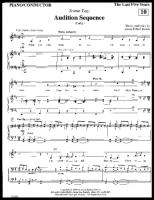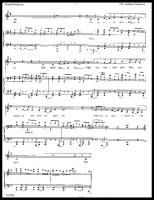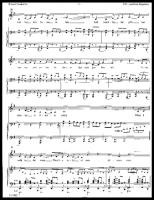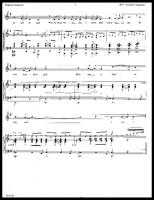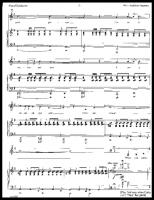Piano Sheet Music
 "...Johnny Cash has only passed into the greater light. He will only become more important in this industry as time goes by ..." Dolly Parton
"...Johnny Cash has only passed into the greater light. He will only become more important in this industry as time goes by ..." Dolly Parton
Nelly Furtado
 Nelly Kim Furtado (born December 2, 1978) is a Canadian singer-songwriter, record producer, actress and instrumentalist, who also holds Portuguese citizenship.
Nelly Kim Furtado (born December 2, 1978) is a Canadian singer-songwriter, record producer, actress and instrumentalist, who also holds Portuguese citizenship.Furtado came to fame in 2000 with the release of her debut album Whoa, Nelly!, which featured her breakthrough Grammy Award-winning single "I'm like a Bird". After becoming a mother and releasing the less commercially successful Folklore (2003), she returned to prominence in 2006 with the release of Loose and its hit singles "Promiscuous", "Maneater", "Say It Right", and "All Good Things (Come to an End)". Furtado is known for experimenting with different instruments, sounds, genres, vocal styles and languages. This diversity has been influenced by her wide-ranging musical taste and her interest in different cultures.
Vytauto Kernagio
The Sound of Music
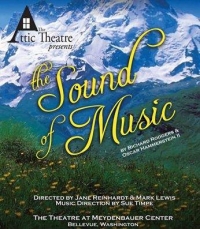 The Sound of Music is a musical with music by Richard Rodgers, lyrics by Oscar Hammerstein II, and a book by Howard Lindsay and Russel Crouse. It is based on the memoir of Maria von Trapp, The Story of the Trapp Family Singers. Songs from the musical that have become standards include "The Sound of Music", "Edelweiss", "My Favorite Things", "Climb Ev'ry Mountain", and "Do-Re-Mi".
The Sound of Music is a musical with music by Richard Rodgers, lyrics by Oscar Hammerstein II, and a book by Howard Lindsay and Russel Crouse. It is based on the memoir of Maria von Trapp, The Story of the Trapp Family Singers. Songs from the musical that have become standards include "The Sound of Music", "Edelweiss", "My Favorite Things", "Climb Ev'ry Mountain", and "Do-Re-Mi".The original Broadway production opened in November 1959, and the show has enjoyed numerous productions and revivals since then. It has also been made into an Academy Award-winning 1965 movie musical. The Sound of Music was the final musical written by Rodgers and Hammerstein; Hammerstein died of cancer nine months after the Broadway premiere.
Genesis
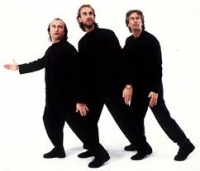 Genesis are an English rock band that formed in 1967. The band currently comprises the longest-tenured members Phil Collins, Mike Rutherford and Tony Banks. Past members Peter Gabriel, Anthony Phillips and Steve Hackett also played major roles in the band in its early years. Genesis are among the top 30 highest-selling recording artists of all time with approximately 150 million albums sold worldwide.
Genesis are an English rock band that formed in 1967. The band currently comprises the longest-tenured members Phil Collins, Mike Rutherford and Tony Banks. Past members Peter Gabriel, Anthony Phillips and Steve Hackett also played major roles in the band in its early years. Genesis are among the top 30 highest-selling recording artists of all time with approximately 150 million albums sold worldwide.
Avenue Q
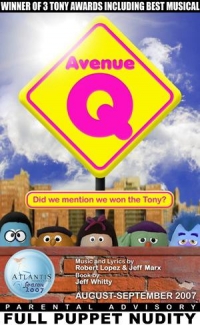 Avenue Q is a musical conceived by Robert Lopez and Jeff Marx, who wrote the music and lyrics, and directed by Jason Moore. The book is by Jeff Whitty. The show was produced by and opened at the Off-Broadway Vineyard Theatre in March 2003. The production transferred to Broadway in July 2003 and won several Tony Awards, including the award for Best Musical. It is still running on Broadway and holds the position of 26th longest running musical in Broadway history. The show has spawned a 2005 Las Vegas production, a 2006 West End production and various international productions. A U.S. national tour began in July 2007.
Avenue Q is a musical conceived by Robert Lopez and Jeff Marx, who wrote the music and lyrics, and directed by Jason Moore. The book is by Jeff Whitty. The show was produced by and opened at the Off-Broadway Vineyard Theatre in March 2003. The production transferred to Broadway in July 2003 and won several Tony Awards, including the award for Best Musical. It is still running on Broadway and holds the position of 26th longest running musical in Broadway history. The show has spawned a 2005 Las Vegas production, a 2006 West End production and various international productions. A U.S. national tour began in July 2007.The show is largely inspired by (and is in the style of) Sesame Street: Most of the characters in the show are puppets (operated by actors onstage), the set depicts several tenements on a rundown street in an "outer borough" of New York City, both the live characters and puppet characters sing, and short animated video clips are played as part of the story. Also, several characters are recognizably parodies of classic Sesame Street characters: for example, the roommates Rod and Nicky are versions of Sesame Street's Bert and Ernie, and Trekkie Monster is based on Cookie Monster. However, the characters are in their twenties and thirties and face adult problems instead of those faced by pre-schoolers, thus making the show more suited for the adults who grew up with Sesame Street. The characters use profanity, and the songs concern adult themes (except the opening number). A recurring theme is the central character's search for a "purpose." Since the musical soundtrack for it was released, the song "The Internet is For Porn" has become particularly popular on websites such as YouTube and can be downloaded for free from the official website. According to the official site, the musical is appropriate for both adults and teenagers.
Trova Yucateca
 Yucatan born trova singer, composer and guitar player who reached acknowledge from the audiences while participating at OTI Festival in the 80s.
Yucatan born trova singer, composer and guitar player who reached acknowledge from the audiences while participating at OTI Festival in the 80s.
Pachelbel
 Johann Pachelbel (baptized September 1, 1653 – buried March 9, 1706) was a German Baroque composer, organist and teacher who brought the south German organ tradition to its peak. He composed a large body of sacred and secular music, and his contributions to the development of the chorale prelude and fugue have earned him a place among the most important composers of the middle Baroque era.
Johann Pachelbel (baptized September 1, 1653 – buried March 9, 1706) was a German Baroque composer, organist and teacher who brought the south German organ tradition to its peak. He composed a large body of sacred and secular music, and his contributions to the development of the chorale prelude and fugue have earned him a place among the most important composers of the middle Baroque era.Pachelbel's work enjoyed enormous popularity during his lifetime; he had many pupils and his music became a model for the composers of south and central Germany. Today, Pachelbel is best known for the Canon in D, the only canon he wrote. In addition to the canon, his most well-known works include the Chaconne in F minor, the Toccata in E minor for organ, and the Hexachordum Apollinis, a set of keyboard variations.
Pachelbel's music was influenced by southern German composers, such as Johann Jakob Froberger and Johann Kaspar Kerll, Italians such as Girolamo Frescobaldi and Alessandro Poglietti, French composers, and the composers of the Nuremberg tradition. Pachelbel preferred a lucid, uncomplicated contrapuntal style that emphasized melodic and harmonic clarity. His music is less virtuosic and less adventurous harmonically than that of Dieterich Buxtehude, although, like Buxtehude, Pachelbel experimented with different ensembles and instrumental combinations in his chamber music and, most importantly, his vocal music, much of which features exceptionally rich instrumentation. Pachelbel explored many variation forms and associated techniques, which manifest themselves in various diverse pieces, from sacred concertos to harpsichord suites.
José María Cano
 José Cano Andrés is a Spanish visual artist, musician, composer, and record producer. From 1982 to 1998, he was a member and principal composer of the Spanish pop-rock band Mecano. Since 1998, he works primarily in the visual arts.
José Cano Andrés is a Spanish visual artist, musician, composer, and record producer. From 1982 to 1998, he was a member and principal composer of the Spanish pop-rock band Mecano. Since 1998, he works primarily in the visual arts.
Chopin
 Frédéric Chopin (1 March 1810 – 17 October 1849) was a Polish composer and virtuoso pianist of the Romantic period. He is widely regarded as the greatest Polish composer, and ranks as one of music's greatest tone poets.
Frédéric Chopin (1 March 1810 – 17 October 1849) was a Polish composer and virtuoso pianist of the Romantic period. He is widely regarded as the greatest Polish composer, and ranks as one of music's greatest tone poets.He was born in the village of Żelazowa Wola, in the Duchy of Warsaw, to a Polish mother and French-expatriate father, and in his early life was regarded as a child-prodigy pianist. In November 1830, at the age of 20, Chopin went abroad; following the suppression of the Polish November Uprising of 1830–31, he became one of many expatriates of the Polish "Great Emigration."
In Paris, he made a comfortable living as a composer and piano teacher, while giving few public performances. A Polish patriot,
Chopin's extant compositions were written primarily for the piano as a solo instrument. Though technically demanding, Chopin's style emphasizes nuance and expressive depth rather than virtuosity. Chopin invented musical forms such as the ballade and was responsible for major innovations in forms such as the piano sonata, waltz, nocturne, étude, impromptu and prelude. His works are mainstays of Romanticism in 19th-century classical music.
Gundam Seed Destiny
 Mobile Suit Gundam SEED Destiny (機動戦士ガンダムSEED DESTINY Kidō Senshi Gandamu Shīdo Desutinī?) is the second anime television series set in the Cosmic Era universe of Gundam by Sunrise. Set two years after the original Mobile Suit Gundam SEED, Gundam SEED Destiny features many new characters and some returning ones. The series spanned 50 episodes (plus a recap episode entitled "Edited"), aired in Japan from October 9, 2004 to October 1, 2005 at 6:00 p.m. on the JNN TV stations TBS and MBS. The series won the Animage Anime Grand Prix prize in 2004 and 2005.
Mobile Suit Gundam SEED Destiny (機動戦士ガンダムSEED DESTINY Kidō Senshi Gandamu Shīdo Desutinī?) is the second anime television series set in the Cosmic Era universe of Gundam by Sunrise. Set two years after the original Mobile Suit Gundam SEED, Gundam SEED Destiny features many new characters and some returning ones. The series spanned 50 episodes (plus a recap episode entitled "Edited"), aired in Japan from October 9, 2004 to October 1, 2005 at 6:00 p.m. on the JNN TV stations TBS and MBS. The series won the Animage Anime Grand Prix prize in 2004 and 2005.
Pasek and Paul
 Pasek and Paul (Benj Pasek and Justin Paul) are a musical theatre writing team living in New York City.
Pasek and Paul (Benj Pasek and Justin Paul) are a musical theatre writing team living in New York City.Pasek and Paul began their collaboration as freshmen at the University of Michigan and completed their BFA degrees in musical theatre in December 2006.
They are the winners of a 2007 Jonathan Larson Award, which is named after the late Rent composer and honors achievement by composers, lyricists and librettists. Tina Landau and Stephen Schwartz were among the judges panel for the 2007 year. At age 21, Benj and Justin became the youngest recipients in the history of the foundation and were awarded a $20,000 cash prize, the highest amount ever given to a team.
Pasek and Paul are writers for John Tartaglia's Disney Channel television series "Johnny and the Sprites". The series premiere featured a song by Pasek and Paul titled "I Just Can't Get Enough".
They contributed music to Off-Broadway's upcoming "White Noise, ", which won Talkin' Broadway's 2006 Summer Theatre Festival Citation for Outstanding Original Score.
They have played sold-out shows at Joe's Pub at New York's Public Theatre and Ars Nova in New York City featuring a host of Broadway talents including Shoshana Bean, Billy Porter, Gavin Creel, Cheyenne Jackson, Steven Pasquale, Karen Mason, Celia Keenan-Bolger, and many more.
They were invited to participate in the first ever Johnny Mercer Songwriting Festival funded by the American Musical Theatre Project and are developing several original book musicals.
John Lennon
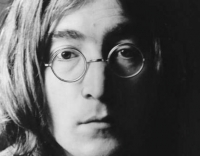 John Winston Ono Lennon, MBE (born John Winston Lennon; October 9, 1940 – December 8, 1980) was an English rock musician, singer, songwriter, artist, and peace activist who gained worldwide fame as one of the founding members of The Beatles. As a member of the group, Lennon was one of the lead vocalists and co-wrote many of the band's songs with Paul McCartney.
John Winston Ono Lennon, MBE (born John Winston Lennon; October 9, 1940 – December 8, 1980) was an English rock musician, singer, songwriter, artist, and peace activist who gained worldwide fame as one of the founding members of The Beatles. As a member of the group, Lennon was one of the lead vocalists and co-wrote many of the band's songs with Paul McCartney.In his solo career, Lennon wrote and recorded songs such as "Give Peace a Chance" and "Imagine". Lennon revealed his rebellious nature and wit on television, in films such as A Hard Day's Night, in books such as In His Own Write, and in press conferences and interviews. He was controversial through his work as a peace activist, artist, and author.
Lennon had two sons: Julian Lennon, with his first wife Cynthia Lennon, and Sean Ono Lennon, with his second wife, avant-garde artist Yoko Ono. After a self-imposed retirement from 1976 to 1980, Lennon reemerged with a comeback album, but was murdered one month later in New York City on 8 December 1980. In 2002, respondents to a BBC poll on the 100 Greatest Britons voted Lennon into eighth place. In 2004, Rolling Stone magazine ranked Lennon number 38 on its list of "The Immortals: The Fifty Greatest Artists of All Time" and ranked The Beatles at number one.
Howie Day
 Howard Kern Day (born in Bangor, Maine) is an American singer-songwriter. Beginning his career as a solo artist in the late 1990s, Day became known for his extensive touring and in-concert use of samplers and effects pedals in order to accompany himself. He self-financed and self-released his first album, Australia, in 2000.
Howard Kern Day (born in Bangor, Maine) is an American singer-songwriter. Beginning his career as a solo artist in the late 1990s, Day became known for his extensive touring and in-concert use of samplers and effects pedals in order to accompany himself. He self-financed and self-released his first album, Australia, in 2000.Day signed to the major label Epic Records in 2002 and has since re-released his debut as well as producing a follow up, Stop All The World Now. Despite initially sluggish sales, Stop All The World Now was certified gold in early 2005 and has produced a number of singles, including "Collide", Day's most successful to date, and the hit "She Says".
Day has received significant negative attention over two high profile arrests. In 2004, Day was arrested and charged over an incident in which he was accused of locking a fan in the bathroom of his tour bus and destroying the cellular phone of another, for which he was fined. In December 2005, Day was arrested in Boston after reportedly verbally abusing the flight crew while under the influence of alcohol and sleeping pills. He was sentenced to one year's probation on April 26, 2006.
Ludwig van Beethoven
 Ludwig van Beethoven (/ˈlʊdvɪɡ væn ˈbeɪt(h)oʊvən/ (About this soundlisten); German: (About this soundlisten); baptised 17 December 1770 – 26 March 1827) was a German composer and pianist. A crucial figure in the transition between the classical and romantic eras in classical music, he remains one of the most recognized and influential musicians of this period, and is considered to be one of the greatest composers of all time.
Ludwig van Beethoven (/ˈlʊdvɪɡ væn ˈbeɪt(h)oʊvən/ (About this soundlisten); German: (About this soundlisten); baptised 17 December 1770 – 26 March 1827) was a German composer and pianist. A crucial figure in the transition between the classical and romantic eras in classical music, he remains one of the most recognized and influential musicians of this period, and is considered to be one of the greatest composers of all time.Beethoven was born in Bonn, the capital of the Electorate of Cologne, and part of the Holy Roman Empire. He displayed his musical talents at an early age and was vigorously taught by his father Johann van Beethoven, and was later taught by composer and conductor Christian Gottlob Neefe. At age 21, he moved to Vienna and studied composition with Joseph Haydn. Beethoven then gained a reputation as a virtuoso pianist, and was soon courted by Prince Lichnowsky for compositions, which resulted in Opus 1 in 1795.
Handel
 George Frideric Handel (Friday, 23 February 1685 - Saturday, 14 April 1759) was a German-born Baroque composer who is famous for his operas, oratorios and concerti grossi. Born as Georg Friedrich Handel in Halle, he spent most of his adult life in England, becoming a subject of the British crown on 22 January 1727. His most famous works are Messiah, an oratorio set to texts from the King James Bible; Water Music; and Music for the Royal Fireworks. Strongly influenced by the techniques of the great composers of the Italian Baroque and the English composer Henry Purcell, his music was known to many significant composers who came after him, including Haydn, Mozart, and Beethoven.
George Frideric Handel (Friday, 23 February 1685 - Saturday, 14 April 1759) was a German-born Baroque composer who is famous for his operas, oratorios and concerti grossi. Born as Georg Friedrich Handel in Halle, he spent most of his adult life in England, becoming a subject of the British crown on 22 January 1727. His most famous works are Messiah, an oratorio set to texts from the King James Bible; Water Music; and Music for the Royal Fireworks. Strongly influenced by the techniques of the great composers of the Italian Baroque and the English composer Henry Purcell, his music was known to many significant composers who came after him, including Haydn, Mozart, and Beethoven.Handel's compositions include 42 operas; 29 oratorios; more than 120 cantatas, trios and duets; numerous arias; chamber music; a large number of ecumenical pieces; odes and serenatas; and sixteen organ concerti. His most famous work, the Messiah oratorio with its "Hallelujah" chorus, is among the most popular works in choral music and has become a centerpiece of the Christmas season. Also popular are the Opus 3 and 6 Concerti Grossi, as well as "The Cuckoo and the Nightingale", in which birds are heard calling during passages played in different keys representing the vocal ranges of two birds. Also notable are his sixteen keyboard suites, especially The Harmonious Blacksmith.
Handel introduced various previously uncommon musical instruments in his works: the viola d'amore and violetta marina (Orlando), the lute (Ode for St. Cecilia's Day), three trombones (Saul), clarinets or small high cornets (Tamerlano), theorbo, French horn (Water Music), lyrichord, double bassoon, viola da gamba, bell chimes, positive organ, and harp (Giulio Cesare, Alexander's Feast).
Rodgers and Hart
 Rodgers and Hart were an American songwriting partnership between composer Richard Rodgers and the lyricist Lorenz Hart. They worked together on 28 stage musicals and more than 500 songs from 1919 until Hart's death in 1943.
Rodgers and Hart were an American songwriting partnership between composer Richard Rodgers and the lyricist Lorenz Hart. They worked together on 28 stage musicals and more than 500 songs from 1919 until Hart's death in 1943.
Charles-Valentin Alkan
Charles-Valentin Alkan (French: ; 30 November 1813 – 29 March 1888) was a French-Jewish composer and virtuoso pianist. At the height of his fame in the 1830s and 1840s he was, alongside his friends and colleagues Frédéric Chopin and Franz Liszt, among the leading pianists in Paris, a city in which he spent virtually his entire life.Alkan earned many awards at the Conservatoire de Paris, which he entered before he was six. His career in the salons and concert halls of Paris was marked by his occasional long withdrawals from public performance, for personal reasons. Although he had a wide circle of friends and acquaintances in the Parisian artistic world, including Eugène Delacroix and George Sand, from 1848 he began to adopt a reclusive life style, while continuing with his compositions – virtually all of which are for the keyboard.
Steve Nelson
 Steve Edward Nelson was an American songwriter. Born in New York City, Nelson worked for Tin Pan Alley starting there in 1929. He later wrote country songs for artists such as Eddy Arnold and Guy Lombardo. In 1950, probably his best known composition, "Frosty the Snowman" was released, co-written with Jack Rollins.
Steve Edward Nelson was an American songwriter. Born in New York City, Nelson worked for Tin Pan Alley starting there in 1929. He later wrote country songs for artists such as Eddy Arnold and Guy Lombardo. In 1950, probably his best known composition, "Frosty the Snowman" was released, co-written with Jack Rollins.
Traditional
 traditional music
traditional music
Joseph Kosma
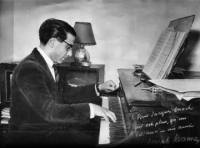 Joseph Kosma was a Hungarian-French composer. Date of birth: October 22, 1905, Budapest, Hungary Date and place of death: August 7, 1969, France
Joseph Kosma was a Hungarian-French composer. Date of birth: October 22, 1905, Budapest, Hungary Date and place of death: August 7, 1969, France
Kingdom Hearts
 Kingdom Hearts III is a 2019 action role-playing game developed and published by Square Enix for the PlayStation 4 and Xbox One. It is the twelfth installment in the Kingdom Hearts series, and serves as a conclusion of the "Dark Seeker saga" plot arc beginning with the original game.
Kingdom Hearts III is a 2019 action role-playing game developed and published by Square Enix for the PlayStation 4 and Xbox One. It is the twelfth installment in the Kingdom Hearts series, and serves as a conclusion of the "Dark Seeker saga" plot arc beginning with the original game.
Marc-André Hamelin
Marc-André Hamelin, OC, CQ (born September 5, 1961), is a Canadian virtuoso pianist and composer. Hamelin is recognized worldwide for the originality and technical proficiency of his performances of the classic repertoire. He has received 11 Grammy Award nominations.
Freddie Mercury
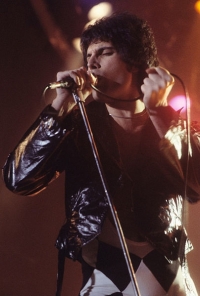 Freddie Mercury (born Farrokh Bulsara, 5 September 1946 – 24 November 1991), was a British musician, best known as the lead vocalist of the rock band Queen. As a performer, he was known for his powerful vocals and flamboyant performances. As a songwriter, he composed many hits, including "Bohemian Rhapsody", "Killer Queen", "Somebody to Love", "Don't Stop Me Now", "Crazy Little Thing Called Love", "Barcelona", and "We Are the Champions". Led by Mercury, Queen had sold more than 300 million albums internationally by 2009.
Freddie Mercury (born Farrokh Bulsara, 5 September 1946 – 24 November 1991), was a British musician, best known as the lead vocalist of the rock band Queen. As a performer, he was known for his powerful vocals and flamboyant performances. As a songwriter, he composed many hits, including "Bohemian Rhapsody", "Killer Queen", "Somebody to Love", "Don't Stop Me Now", "Crazy Little Thing Called Love", "Barcelona", and "We Are the Champions". Led by Mercury, Queen had sold more than 300 million albums internationally by 2009.In addition to his work with Queen, he also led a solo career and was occasionally a producer and guest musician (piano or vocals) for other artists. Mercury, who was a Parsi and grew up in India, has been referred to as "Britain's first Asian rock star". He died of bronchopneumonia induced by AIDS on 24 November 1991, only one day after publicly acknowledging he had the disease. In 2006, Time Asia named him as one of the most influential Asian heroes of the past 60 years, and he continues to be voted as one of the greatest singers in the history of popular music. In 2005, a poll organised by Blender and MTV2 saw Mercury voted the greatest male singer of all time (and second-greatest singer overall after Mariah Carey). In 2009, a Classic Rock poll saw him voted the greatest rock singer of all time. In 2008, Rolling Stone ranked him number 18 on their list of the 100 greatest singers of all time, reflecting the magazine's editorial opinion.
Mehmet Ilgın
 Turkish musician and composer.
Turkish musician and composer.
Aaron Copland
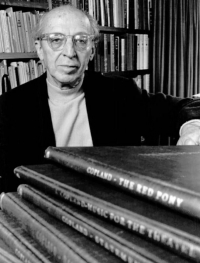 Aaron Copland (/ˈkoʊplənd/, KOHP-lənd; November 14, 1900 – December 2, 1990) was an American composer, composition teacher, writer, and later a conductor of his own and other American music. Copland was referred to by his peers and critics as "the Dean of American Composers". The open, slowly changing harmonies in much of his music are typical of what many people consider to be the sound of American music, evoking the vast American landscape and pioneer spirit.
Aaron Copland (/ˈkoʊplənd/, KOHP-lənd; November 14, 1900 – December 2, 1990) was an American composer, composition teacher, writer, and later a conductor of his own and other American music. Copland was referred to by his peers and critics as "the Dean of American Composers". The open, slowly changing harmonies in much of his music are typical of what many people consider to be the sound of American music, evoking the vast American landscape and pioneer spirit.
John Forster
 John Forster is an American cabaret musician, satirist, songwriter, composer, lyricist, and record producer. He has released several solo and collaborative albums, and has also worked on several revues and musicals.
John Forster is an American cabaret musician, satirist, songwriter, composer, lyricist, and record producer. He has released several solo and collaborative albums, and has also worked on several revues and musicals.
Bob Chilcott
 Robert "Bob" Chilcott (born 9 April 1955) is a British choral composer, conductor, and singer, based in Oxfordshire, England. He was a member of the King's Singers from 1985 to 1997, singing tenor. He has been a composer since 1997.Chilcott was born in Plymouth. He sang in the Choir of King's College, Cambridge, both as a boy and as a university student, when he conducted the voluntary Choral Society, which included many singers from other colleges. He performed the Pie Jesu of Fauré's Requiem on the 1967 King's College recording.
Robert "Bob" Chilcott (born 9 April 1955) is a British choral composer, conductor, and singer, based in Oxfordshire, England. He was a member of the King's Singers from 1985 to 1997, singing tenor. He has been a composer since 1997.Chilcott was born in Plymouth. He sang in the Choir of King's College, Cambridge, both as a boy and as a university student, when he conducted the voluntary Choral Society, which included many singers from other colleges. He performed the Pie Jesu of Fauré's Requiem on the 1967 King's College recording.
Isaac Albeniz
 Isaac Albéniz i Pascual (Spanish pronunciation: ) (May 29, 1860 – May 18, 1909) was a Spanish pianist and composer best known for his piano works based on folk music.
Isaac Albéniz i Pascual (Spanish pronunciation: ) (May 29, 1860 – May 18, 1909) was a Spanish pianist and composer best known for his piano works based on folk music.Albéniz’ Suite Española Op.47 is comprised mainly of pieces written in 1886, and grouped together in 1887 in honor of the Queen of Spain. Like many of Albéniz' piano pieces, these works are miniature tone pictures of different geographical regions and musical idioms of Spain. The eight original titles are Granada, Cataluna, Sevilla, Cadiz, Asturias, Aragon, Castilla and Cuba but only the first three titles and Cuba appeared in the original collection. The other pieces were published in later collections, often with different titles. The publisher Hofmeister published all eight titles of Suite Espanola in 1911 after Albéniz’ death, appropriating other pieces for the other four titles so those pieces do not always accurately reflect the geographic designation of the titles, most obviously in the case of Asturias (Leyenda) whose Andalusian flamenco rhythms bear little resemblance to the music of the northern province Asturias. The opus number 47 assigned by Hofmeister has no relation to any chronological order in Albéniz’ oeuvre, in which opus numbers were randomly given by publishers or by Albéniz himself, with some pieces appearing in more than one collection.
David Wise
 David Wise (born 1967) is an English video game music composer and musician. He was a composer at Rare from 1985 to 2009, and was the company's sole musician up until 1994. He has gained a cult following for his work on various games, particularly Nintendo's Donkey Kong Country series. Wise is known for his atmospheric style of music, mixing natural environmental sounds with prominent melodic and percussive accompaniment.
David Wise (born 1967) is an English video game music composer and musician. He was a composer at Rare from 1985 to 2009, and was the company's sole musician up until 1994. He has gained a cult following for his work on various games, particularly Nintendo's Donkey Kong Country series. Wise is known for his atmospheric style of music, mixing natural environmental sounds with prominent melodic and percussive accompaniment.
Schumann
 Robert Schumann, sometimes given as Robert Alexander Schumann, (June 8, 1810 – July 29, 1856) was a German composer, aesthete and influential music critic. He is one of the most famous Romantic composers of the 19th century.
Robert Schumann, sometimes given as Robert Alexander Schumann, (June 8, 1810 – July 29, 1856) was a German composer, aesthete and influential music critic. He is one of the most famous Romantic composers of the 19th century.He had hoped to pursue a career as a virtuoso pianist, having been assured by his teacher Friedrich Wieck that he could become the finest pianist in Europe after only a few years of study with him. However, a hand injury prevented those hopes from being realized, and he decided to focus his musical energies on composition. Schumann's published compositions were, until 1840, all for the piano; he later composed works for piano and orchestra, many lieder (songs for voice and piano), four symphonies, an opera, and other orchestral, choral and chamber works. His writings about music appeared mostly in the Neue Zeitschrift für Musik ("The New Journal for Music"), a Leipzig-based publication that he jointly founded.
In 1840, after a long and acrimonious legal battle with his piano instructor Friedrich Wieck, Schumann married Wieck's daughter, pianist Clara Wieck, a considerable figure of the Romantic period in her own right. Clara Wieck showcased many works by her husband as well. For the last two years of his life, after an attempted suicide, Schumann was confined to a mental institution.
James A. Goins
 Here you will find the music, films, musicals, instrumental works and CD recordings of BMI songwriter and composer James A. Goins. Known for being a modern-day Renaissance man, James has established himself as an inventive and musically sensitive director of Theatre, Musicals, and Film. He is a freelance director whose credits include Of Mice and Men, Jesus Christ Superstar, Raisin in the Sun, Taming of the Shrew, Equus, 12 Angry Jurors and Proof just to name a few. His plays and musicals have been workshopped or produced at the Mark Taper Forum Annex, the Laity Theatre Company, New Musicals, Inc. and the Chameleon Theatre Circle. James brings a wealth of knowledge and experience to every project he works on.
Here you will find the music, films, musicals, instrumental works and CD recordings of BMI songwriter and composer James A. Goins. Known for being a modern-day Renaissance man, James has established himself as an inventive and musically sensitive director of Theatre, Musicals, and Film. He is a freelance director whose credits include Of Mice and Men, Jesus Christ Superstar, Raisin in the Sun, Taming of the Shrew, Equus, 12 Angry Jurors and Proof just to name a few. His plays and musicals have been workshopped or produced at the Mark Taper Forum Annex, the Laity Theatre Company, New Musicals, Inc. and the Chameleon Theatre Circle. James brings a wealth of knowledge and experience to every project he works on.
Janis Joplin
 Janis Lyn Joplin (/ˈdʒɒplɪn/; January 19, 1943 – October 4, 1970) was an American singer-songwriter who first rose to fame in the mid 1960s as the lead singer of the psychedelic/acid rock band Big Brother and the Holding Company, and later as a solo artist with her own backing groups, The Kozmic Blues Band and The Full Tilt Boogie Band.
Janis Lyn Joplin (/ˈdʒɒplɪn/; January 19, 1943 – October 4, 1970) was an American singer-songwriter who first rose to fame in the mid 1960s as the lead singer of the psychedelic/acid rock band Big Brother and the Holding Company, and later as a solo artist with her own backing groups, The Kozmic Blues Band and The Full Tilt Boogie Band.Her first ever large scale public performance was at the Monterey Pop Festival, which led to her becoming very popular and one of the major attractions at the Woodstock festival and the Festival Express train tour. Joplin charted five singles; other popular songs include: "Down on Me," "Summertime," "Piece of My Heart," "Ball 'n' Chain," "Maybe," "To Love Somebody," "Kozmic Blues," "Work Me, Lord," "Cry Baby," "Mercedes Benz," and her only number one hit, "Me and Bobby McGee."
Ray Hibbeler
 Ray Hibbeler, a prolific songwriter of the early-to-mid 20th century.
Ray Hibbeler, a prolific songwriter of the early-to-mid 20th century.
Nguyen Duy
 Nguyen-duy was born in Hue, Vietnam. Growing up within thirty kilometers of the demilitarized zone of the 18th Parallel, he describes hearing gunfire every day of his early life. In 1975 he immigrated to the United States as a political refugee.
Nguyen-duy was born in Hue, Vietnam. Growing up within thirty kilometers of the demilitarized zone of the 18th Parallel, he describes hearing gunfire every day of his early life. In 1975 he immigrated to the United States as a political refugee.Pipo has taken on many things in life in pursuit of his diverse interests. As a teenager in Vietnam, he competed as a national athlete in table tennis. He also spent some time during the mid 80’s living as a Buddhist monk in Northern India. In 1983 he earned a Bachelor of Arts degree in economics at Carleton College. He then moved to New York City, where he worked as a bartender and later as a nightclub manager. While living in the East Village in the 80’s, or as Pipo describes, “the crux of creativity in New York,” and meeting people such as musician Don Cherry and artist Keith Haring, Pipo’s interests turned to art. In 1992 he earned a Master of Arts in Photography, followed by a Master of Fine Arts in Photography in 1996, both from the University of New Mexico at Albuquerque.
J.Susa
 J.Susa composer.
J.Susa composer.
Mussorgsky
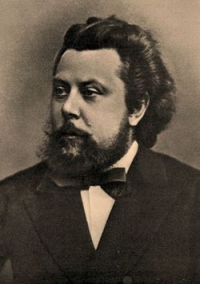 Modest Petrovich Mussorgsky (March 21, 1839 – March 28, 1881), one of the Russian composers known as the Five, was an innovator of Russian music. He strove to achieve a uniquely Russian musical identity, often in deliberate defiance of the established conventions of Western music.
Modest Petrovich Mussorgsky (March 21, 1839 – March 28, 1881), one of the Russian composers known as the Five, was an innovator of Russian music. He strove to achieve a uniquely Russian musical identity, often in deliberate defiance of the established conventions of Western music.Like his literary contemporary Fyodor Dostoyevsky, Mussorgsky depicts in his music "the insulted and the injured" with all their passion and pain. He raises these characters to tragic heights until the grotesque and majestic coexist. Mussorgsky could accomplish this not simply out of compassion or guilt towards them, but because in his works he almost becomes them. Mussorgsky's music is vivid, confused, feverish and ultimately hypnotizing —again, like Dostoyevsky at his best.
Many of his major works were inspired by Russian history, Russian folklore, and other nationalist themes, including the opera Boris Godunov, the orchestral tone poem Night on Bald Mountain, and the piano suite Pictures at an Exhibition. However, while Mussorgsky's music can be vivid and nationalistic, it does not glorify the powerful and is at times (such as in The Field-Marshal) antimilitaristic. For this reason, it was perceived as being directed against the state and its composer "under suspicion." He, like the others in The Russian Five, were considered dangerous extremists by the emperor and his court. This may have been the reason Tsar Alexander III personally crossed off Boris Godounov from the list of proposed pieces for the imperial opera in 1888.
For many years Mussorgsky's works were mainly known in versions revised or completed by other composers. Many of his most important compositions have recently come into their own in their original forms, and some of the original scores are now also available.
Amadeo Tommasi
 Tommasi started his career as a trombonist for a jazz band in Bologna. He gained notoriety in Italy for his performances on the radio show La coppa di jazz in 1960. The following year, he performed in the Sanremo Music Festival and received the First Prize at the Festival Bled in Slovenia. In the years following, he made recordings with Chet Baker, Bobby Jaspar, René Thomas, Buddy Collette, Conte Candoli, and Jacques Pelzer. In the early 1970s, he began composing music for films. In the film The Legend of 1900, he composed each of the recordings and also had a cameo appearance as a pianist. He also appeared in the 2010 documentary Pupi Avati, ieri oggi domani, directed by Claudio Costa.
Tommasi started his career as a trombonist for a jazz band in Bologna. He gained notoriety in Italy for his performances on the radio show La coppa di jazz in 1960. The following year, he performed in the Sanremo Music Festival and received the First Prize at the Festival Bled in Slovenia. In the years following, he made recordings with Chet Baker, Bobby Jaspar, René Thomas, Buddy Collette, Conte Candoli, and Jacques Pelzer. In the early 1970s, he began composing music for films. In the film The Legend of 1900, he composed each of the recordings and also had a cameo appearance as a pianist. He also appeared in the 2010 documentary Pupi Avati, ieri oggi domani, directed by Claudio Costa.
Porcupine Tree
 Porcupine Tree were an English progressive rock band formed by musician Steven Wilson in 1987. The band began essentially as a solo project for Wilson, who created all of the band's music. By late 1993, however, he wanted to work in a band environment, bringing on frequent collaborators Richard Barbieri as keyboardist, Colin Edwin as bassist, and Chris Maitland as drummer to form the first permanent lineup. With Wilson as lead vocalist and guitarist, this remained the lineup until February 2002, when Maitland left the band and Gavin Harrison was recruited to replace him.
Porcupine Tree were an English progressive rock band formed by musician Steven Wilson in 1987. The band began essentially as a solo project for Wilson, who created all of the band's music. By late 1993, however, he wanted to work in a band environment, bringing on frequent collaborators Richard Barbieri as keyboardist, Colin Edwin as bassist, and Chris Maitland as drummer to form the first permanent lineup. With Wilson as lead vocalist and guitarist, this remained the lineup until February 2002, when Maitland left the band and Gavin Harrison was recruited to replace him.
Irwin Levine
 Irwin Jesse Levine (March 23, 1938 – January 21, 1997) was an American songwriter, who co-wrote the song "Tie a Yellow Ribbon Round the Ole Oak Tree" with L. Russell Brown. The song was a worldwide hit for Tony Orlando and Dawn as it reached number one on both the US and UK charts for four weeks in April 1973 and number one on the Australian charts for seven weeks from May to July 1973. It was the top-selling single in 1973 in both the US and UK. In 2008, Billboard ranked the song as the 37th biggest song of all time in its issue celebrating the 50th anniversary of the Hot 100.
Irwin Jesse Levine (March 23, 1938 – January 21, 1997) was an American songwriter, who co-wrote the song "Tie a Yellow Ribbon Round the Ole Oak Tree" with L. Russell Brown. The song was a worldwide hit for Tony Orlando and Dawn as it reached number one on both the US and UK charts for four weeks in April 1973 and number one on the Australian charts for seven weeks from May to July 1973. It was the top-selling single in 1973 in both the US and UK. In 2008, Billboard ranked the song as the 37th biggest song of all time in its issue celebrating the 50th anniversary of the Hot 100.
Mark Mueller
 Mark Mueller is an American songwriter whose career spans pop music, television, film and stage. A two-time winner of the ASCAP Pop Award for writing one of the Most Performed Songs of the year, he’s had three Billboard Top Ten singles and one #1 Adult Contemporary hit. For his work in television, Mueller is the recipient of two Emmy nominations, both in the category of Outstanding Achievement in Music and Lyrics. Born in the Bay Area, Mueller now lives and works in Los Angeles, California.
Mark Mueller is an American songwriter whose career spans pop music, television, film and stage. A two-time winner of the ASCAP Pop Award for writing one of the Most Performed Songs of the year, he’s had three Billboard Top Ten singles and one #1 Adult Contemporary hit. For his work in television, Mueller is the recipient of two Emmy nominations, both in the category of Outstanding Achievement in Music and Lyrics. Born in the Bay Area, Mueller now lives and works in Los Angeles, California.
Abraham Chasins
 Abram Chasins was an American composer, pianist, piano teacher, lecturer, musicologist, music broadcaster, radio executive and author. Born in Manhattan, New York, he attended the Ethical Culture schools and undertook additional studies through the Columbia University Extension School
Abram Chasins was an American composer, pianist, piano teacher, lecturer, musicologist, music broadcaster, radio executive and author. Born in Manhattan, New York, he attended the Ethical Culture schools and undertook additional studies through the Columbia University Extension School
Beethoven
 Ludwig van Beethoven (16 December 1770 - 26 March 1827) was a German composer and pianist. He was a crucial figure in the transitional period between the Classical and Romantic eras in Western classical music, and remains one of the most respected and influential composers of all time.
Ludwig van Beethoven (16 December 1770 - 26 March 1827) was a German composer and pianist. He was a crucial figure in the transitional period between the Classical and Romantic eras in Western classical music, and remains one of the most respected and influential composers of all time.Born in Bonn, then in the Electorate of Cologne (now in modern-day Germany), he moved to Vienna in his early twenties and settled there, studying with Joseph Haydn and quickly gaining a reputation as a virtuoso pianist. Beethoven's hearing gradually deteriorated beginning in his twenties, yet he continued to compose masterpieces, and to conduct and perform, even after he was completely deaf.
Wicked
 Wicked is a musical with songs and lyrics by Stephen Schwartz and a book by Winnie Holzman. The story is based on the best-selling novel Wicked: The Life and Times of the Wicked Witch of the West by Gregory Maguire, a parallel novel of L. Frank Baum's classic story The Wonderful Wizard of Oz from the perspective of the witches of the Land of Oz.
Wicked is a musical with songs and lyrics by Stephen Schwartz and a book by Winnie Holzman. The story is based on the best-selling novel Wicked: The Life and Times of the Wicked Witch of the West by Gregory Maguire, a parallel novel of L. Frank Baum's classic story The Wonderful Wizard of Oz from the perspective of the witches of the Land of Oz.Wicked tells the story of Elphaba, the future Wicked Witch of the West and her relationship with Glinda, the Good Witch of the North. Their friendship struggles through their opposing personalities and viewpoints, rivalry over the same love-interest, their reactions to the Wizard's corrupt government, and, ultimately, Elphaba's public fall from grace. The plot is set mostly before Dorothy's arrival from Kansas, and includes several references to well-known scenes and dialogue in the 1939 film The Wizard of Oz.
The musical debuted on Broadway on October 30, 2003. It is produced by Universal Pictures and directed by Joe Mantello, with musical staging by Wayne Cilento. Its original stars were Idina Menzel as Elphaba, Kristin Chenoweth as Glinda, and Joel Grey as the Wizard. Although the production received mixed reviews and was panned by The New York Times, it has proved to be a favorite among patrons. The Broadway production's success spawned productions in Chicago, Los Angeles, London's West End, Tokyo, Melbourne, and Stuttgart, along with two North American tours that have visited over 30 cities in Canada and the United States.
The score of Wicked is heavily thematic, bearing in some senses more resemblance to a film score than a musical's score. While many musicals' scores develop new motifs and melodies for each song with little overlap, Schwartz integrated a handful of leitmotifs throughout the production. A cast recording of the original Broadway production was released on December 16, 2003, by Universal Music. All of the songs featured on stage are present on the recording with the exception of "The Wizard And I (Reprise)" and "The Wicked Witch of the East". The short reprise of "No One Mourns The Wicked" that opens Act II is attached to the beginning of "Thank Goodness". The music was arranged by Stephen Oremus, who was also the conductor and director, and James Lynn Abbott, with orchestrations by William David Brohn. The recording received the Grammy Award for Best Musical Show Album in 2005 and was certified platinum by the RIAA on November 30, 2006.
Ella Fitzgerald
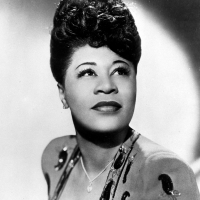 Ella Jane Fitzgerald (April 25, 1917 – June 15, 1996) was an American jazz singer sometimes referred to as the First Lady of Song, Queen of Jazz, and Lady Ella. She was noted for her purity of tone, impeccable diction, phrasing, intonation, and a "horn-like" improvisational ability, particularly in her scat singing. After a tumultuous adolescence, Fitzgerald found stability in musical success with the Chick Webb Orchestra, performing across the country but most often associated with the Savoy Ballroom in Harlem. Her rendition of the nursery rhyme "A-Tisket, A-Tasket" helped boost both her and Webb to national fame. After taking over the band when Webb died, Fitzgerald left it behind in 1942 to start her solo career.
Ella Jane Fitzgerald (April 25, 1917 – June 15, 1996) was an American jazz singer sometimes referred to as the First Lady of Song, Queen of Jazz, and Lady Ella. She was noted for her purity of tone, impeccable diction, phrasing, intonation, and a "horn-like" improvisational ability, particularly in her scat singing. After a tumultuous adolescence, Fitzgerald found stability in musical success with the Chick Webb Orchestra, performing across the country but most often associated with the Savoy Ballroom in Harlem. Her rendition of the nursery rhyme "A-Tisket, A-Tasket" helped boost both her and Webb to national fame. After taking over the band when Webb died, Fitzgerald left it behind in 1942 to start her solo career.
Jon English
 Jonathon James English (born 26 March 1949 in Hampstead, London, England) is an Australian rock singer, musician, actor and writer. Jon English emigrated to Australia with his parents in 1961. He was an early vocalist and rhythm guitarist for Sebastian Hardie but left to take on the role of Judas Iscariot in the Australian version of the stage musical Jesus Christ Superstar from May 1972, which was broadcast on television. English is also a noted solo singer, his Australian top twenty hit singles include "Turn the Page", "Hollywood Seven", "Words are Not Enough", "Six Ribbons" and "Hot Town".
Jonathon James English (born 26 March 1949 in Hampstead, London, England) is an Australian rock singer, musician, actor and writer. Jon English emigrated to Australia with his parents in 1961. He was an early vocalist and rhythm guitarist for Sebastian Hardie but left to take on the role of Judas Iscariot in the Australian version of the stage musical Jesus Christ Superstar from May 1972, which was broadcast on television. English is also a noted solo singer, his Australian top twenty hit singles include "Turn the Page", "Hollywood Seven", "Words are Not Enough", "Six Ribbons" and "Hot Town".English was acclaimed for his starring role in the 1978 Australian TV series Against the Wind - he won the TV Week Logie Award for 'Best New Talent in Australia'. He also co-wrote and performed the score with Mario Millo (ex-Sebastian Hardie). The series had international release, known as Mot alla vindar (1980) in Swedish, where both "Six Ribbons" and "Against the Wind" were released as singles, both singles and the soundtrack album peaked at #1 on the Norwegian charts; the first single, "Six Ribbons" and the album, peaked at #4 on the Swedish charts.
During 1983-1985, English won four Mo Awards with three consecutive 'Entertainer of the Year' awards and a further 'Male Vocal Performer' in 1985. English has performed in Gilbert and Sullivan's operettas The Pirates of Penzance, The Mikado and H.M.S. Pinafore from 1984. Performances of Essgee Entertainment's productions of the Gilbert and Sullivan trilogy from 1994 to 1997 were broadcast on Australian TV, they were all released on VHS and subsequently on DVD.
George Gershwin
 George Gershwin (September 26, 1898 – July 11, 1937) was an American composer. He wrote most of his vocal and theatrical works in collaboration with his elder brother, lyricist Ira Gershwin. George Gershwin composed songs both for Broadway and for the classical concert hall. He also wrote popular songs with success.
George Gershwin (September 26, 1898 – July 11, 1937) was an American composer. He wrote most of his vocal and theatrical works in collaboration with his elder brother, lyricist Ira Gershwin. George Gershwin composed songs both for Broadway and for the classical concert hall. He also wrote popular songs with success.Many of his compositions have been used on television and in numerous films, and many became jazz standards. The jazz singer Ella Fitzgerald recorded many of the Gershwins' songs on her 1959 Gershwin Songbook (arranged by Nelson Riddle). Countless singers and musicians have recorded Gershwin songs, including Fred Astaire, Louis Armstrong, Al Jolson, Bobby Darin, Art Tatum, Bing Crosby, Janis Joplin, John Coltrane, Frank Sinatra, Billie Holiday, Sam Cooke, Miles Davis, Herbie Hancock, Madonna, Judy Garland, Julie Andrews, Barbra Streisand, Marni Nixon, Natalie Cole, Patti Austin, Nina Simone, Maureen McGovern, John Fahey, The Residents, Than & Sam, Sublime, and Sting. A residential building is named after him on the Stony Brook University campus.
Count Basie
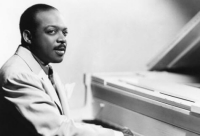 Count Basie Jazz pianist William "Count" Basie is an American jazz pianist, organist and jazz orchestra conductor.
Count Basie Jazz pianist William "Count" Basie is an American jazz pianist, organist and jazz orchestra conductor.Date of birth: August 21, 1904, Red Bank, New Jersey, USA Date and place of death: April 26, 1984, Hollywood, Florida, USA Instrument: Piano; Organ
Michael Kamen
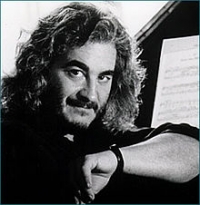 Michael Arnold Kamen was born in New York City, United States, the second of four sons. His father, Saul Kamen, was a dentist, and his mother, Helen, was a teacher. He was of Jewish heritage.
Michael Arnold Kamen was born in New York City, United States, the second of four sons. His father, Saul Kamen, was a dentist, and his mother, Helen, was a teacher. He was of Jewish heritage.While attending The High School of Music & Art in New York City, Michael Kamen became friends with Martin Fulterman (later known as Mark Snow, who composed the theme music for The X-Files among other projects). While studying the oboe, he formed a rock-classical fusion band called New York Rock & Roll Ensemble, together with classmates Fulterman and Dorian Rudnytsky along with Clifton Nivison and Brian Corrigan of Toms River, New Jersey. The group released five albums from 1968 to 1972 (Self-Titled, Reflections, Faithful Friends, Roll Over & Freedomburger). The group performed in white tie (not tuxedos), as typically worn by classical musicians. In the middle of the concert, Fulterman and Kamen would play an oboe duet. The group backed up friend and classmate Janis Ian in a concert at Alice Tully Hall in late 1967.
After graduating from high school, Kamen attended The Juilliard School, in Manhattan, New York City.
Hillsong United
 The Hillsong United band is an Australian rock and worship band, a part of Hillsong Church's youth ministry Hillsong United. Their music is a contemporary style of praise and worship tempered with mainstream rock.
The Hillsong United band is an Australian rock and worship band, a part of Hillsong Church's youth ministry Hillsong United. Their music is a contemporary style of praise and worship tempered with mainstream rock.Current members of the Hillsong United band include Jonathon Douglass (J.D.), Jadwin "Jad" Gillies, Holly Watson, Annie Garratt, Bec Gillies, and Michelle Fragar, daughter of Russell Fragar. Michael Guy Chislett plays guitar and Matthew Tennikoff plays bass guitar. Former original drummer Luke Munns made a transition from the drums to front the rock/indie band LUKAS. Popular New Zealand artist Brooke Fraser recently joined the band when she joined the church, first appearing on United We Stand.
The annual Hillsong United CD/DVD was recorded over many years during their October youth conference Encounterfest, with the album released in the first quarter of the following year. The 2007 album All of the Above was the first album to be fully studio recorded, containing videos of songs on the DVD. The band has toured in a number of countries, leading worship to thousands in North and South America, Europe and Asia.
Diana Krall
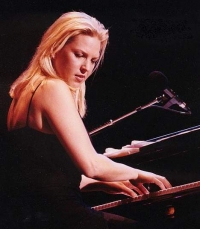 Diana Jean Krall, (born November 16, 1964) is a Canadian jazz pianist and singer.
Diana Jean Krall, (born November 16, 1964) is a Canadian jazz pianist and singer.Krall was born into a musical family in Nanaimo, British Columbia, Canada. She began learning the piano at the age of four. In high school, she started playing in a small jazz group. When she was 15 she started playing regularly in several Nanaimo restaurants.
At age seventeen she won a scholarship from the Vancouver International Jazz Festival to study at the Berklee College of Music in Boston, and completed three terms.
In Nanaimo her playing attracted the attention of famed bass player Ray Brown (ex-husband of the late Ella Fitzgerald, long-time member of the Oscar Peterson Trio and Grammy-winning composer) and drummer Jeff Hamilton. After hearing her play, Brown and Hamilton persuaded Krall to move to Los Angeles, and study with pianist Jimmy Rowles, with whom she began to sing. This also brought her into contact with influential teachers and producers. In 1990, Krall relocated to New York.
Maroon 5
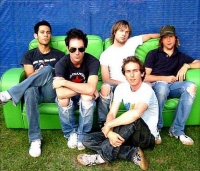 Maroon 5 is a Grammy Award-winning American pop rock band. Formed with only two members at the French Woods Festival of the Performing Arts and expanded in Los Angeles, the group comprises five members: Adam Levine (lead vocals, rhythm guitar), James Valentine (lead guitar, backing vocals), Jesse Carmichael (keyboards, rhythm guitar, backing vocals), Mickey Madden (bass guitar), and Matt Flynn (drums, percussion).
Maroon 5 is a Grammy Award-winning American pop rock band. Formed with only two members at the French Woods Festival of the Performing Arts and expanded in Los Angeles, the group comprises five members: Adam Levine (lead vocals, rhythm guitar), James Valentine (lead guitar, backing vocals), Jesse Carmichael (keyboards, rhythm guitar, backing vocals), Mickey Madden (bass guitar), and Matt Flynn (drums, percussion).
Vinicius de Moraes
 Marcus Vinicius da Cruz e Mello Moraes, also known as Vinicius de Moraes and nicknamed O Poetinha, was a Brazilian poet, lyricist, essayist, and playwright. He served as a diplomat, composed bossa nova music, and recorded several albums.
Marcus Vinicius da Cruz e Mello Moraes, also known as Vinicius de Moraes and nicknamed O Poetinha, was a Brazilian poet, lyricist, essayist, and playwright. He served as a diplomat, composed bossa nova music, and recorded several albums.
Jason Robert Brown
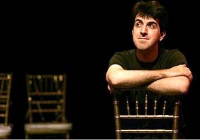 Jason Robert Brown (born 1970 in Ossining, New York) is an American musical theater composer and lyricist. Often cited as one of the "New School" of theatrical composers (a list that includes Michael John LaChiusa, Adam Guettel, Andrew Lippa, and Jeanine Tesori, among others), Brown's music sensibility fuses pop-rock stylings with theatrical lyrics. An accomplished pianist, Brown has often served as music director, conductor, orchestrator and pianist for his own productions.
Jason Robert Brown (born 1970 in Ossining, New York) is an American musical theater composer and lyricist. Often cited as one of the "New School" of theatrical composers (a list that includes Michael John LaChiusa, Adam Guettel, Andrew Lippa, and Jeanine Tesori, among others), Brown's music sensibility fuses pop-rock stylings with theatrical lyrics. An accomplished pianist, Brown has often served as music director, conductor, orchestrator and pianist for his own productions.Ann Ronell
 Ann Ronell (née Rosenblatt; December 25, 1905 — December 25, 1993) was an American composer and lyricist. She was best known for the standards "Willow Weep for Me" (1932) and "Who's Afraid of the Big Bad Wolf" (1933).
Ann Ronell (née Rosenblatt; December 25, 1905 — December 25, 1993) was an American composer and lyricist. She was best known for the standards "Willow Weep for Me" (1932) and "Who's Afraid of the Big Bad Wolf" (1933).
Search for Free Sheet Music
You can make a search through the entire collection of sheets.
You can make a search through the entire collection of sheets.





































































































































































































